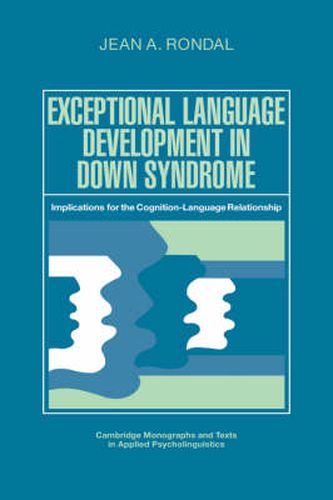Readings Newsletter
Become a Readings Member to make your shopping experience even easier.
Sign in or sign up for free!
You’re not far away from qualifying for FREE standard shipping within Australia
You’ve qualified for FREE standard shipping within Australia
The cart is loading…






Is normal language acquisition possible in spite of serious intellectual impairment? The answer, it would appear, is positive. This book summarizes and discusses recent evidence in this respect. The bulk of the argument comes from the in depth study of a Down Syndrome adult woman with standard trisomy 21, exhibiting virtually normal expressive and receptive grammar. The case is compared to a small number of other exceptional cases of language development in mental retardation, as published in the recent specialized literature. Cases such as those are powerful arguments against ‘cognition drives language’ or better ‘cognition drives grammar’ theories and hypotheses. Data analysis and comparison with other empirical indications in language pathology (specific language impaired children, aphasic syndromes, degenerative syndromes, dementias) suggest dividing lines in the language system relevant to the modularity problem. Also, comparison of data on language exceptional and language-typical mentally retarded subjects supplies interesting arguments in favor of a conception of grammatical development as the gradual unfolding of innate species-specific dispositions, which are prevented to be realized ontogenetically in typical mental retardates for reason of the anomalies of early brain development in these subjects.
$9.00 standard shipping within Australia
FREE standard shipping within Australia for orders over $100.00
Express & International shipping calculated at checkout
Stock availability can be subject to change without notice. We recommend calling the shop or contacting our online team to check availability of low stock items. Please see our Shopping Online page for more details.
Is normal language acquisition possible in spite of serious intellectual impairment? The answer, it would appear, is positive. This book summarizes and discusses recent evidence in this respect. The bulk of the argument comes from the in depth study of a Down Syndrome adult woman with standard trisomy 21, exhibiting virtually normal expressive and receptive grammar. The case is compared to a small number of other exceptional cases of language development in mental retardation, as published in the recent specialized literature. Cases such as those are powerful arguments against ‘cognition drives language’ or better ‘cognition drives grammar’ theories and hypotheses. Data analysis and comparison with other empirical indications in language pathology (specific language impaired children, aphasic syndromes, degenerative syndromes, dementias) suggest dividing lines in the language system relevant to the modularity problem. Also, comparison of data on language exceptional and language-typical mentally retarded subjects supplies interesting arguments in favor of a conception of grammatical development as the gradual unfolding of innate species-specific dispositions, which are prevented to be realized ontogenetically in typical mental retardates for reason of the anomalies of early brain development in these subjects.